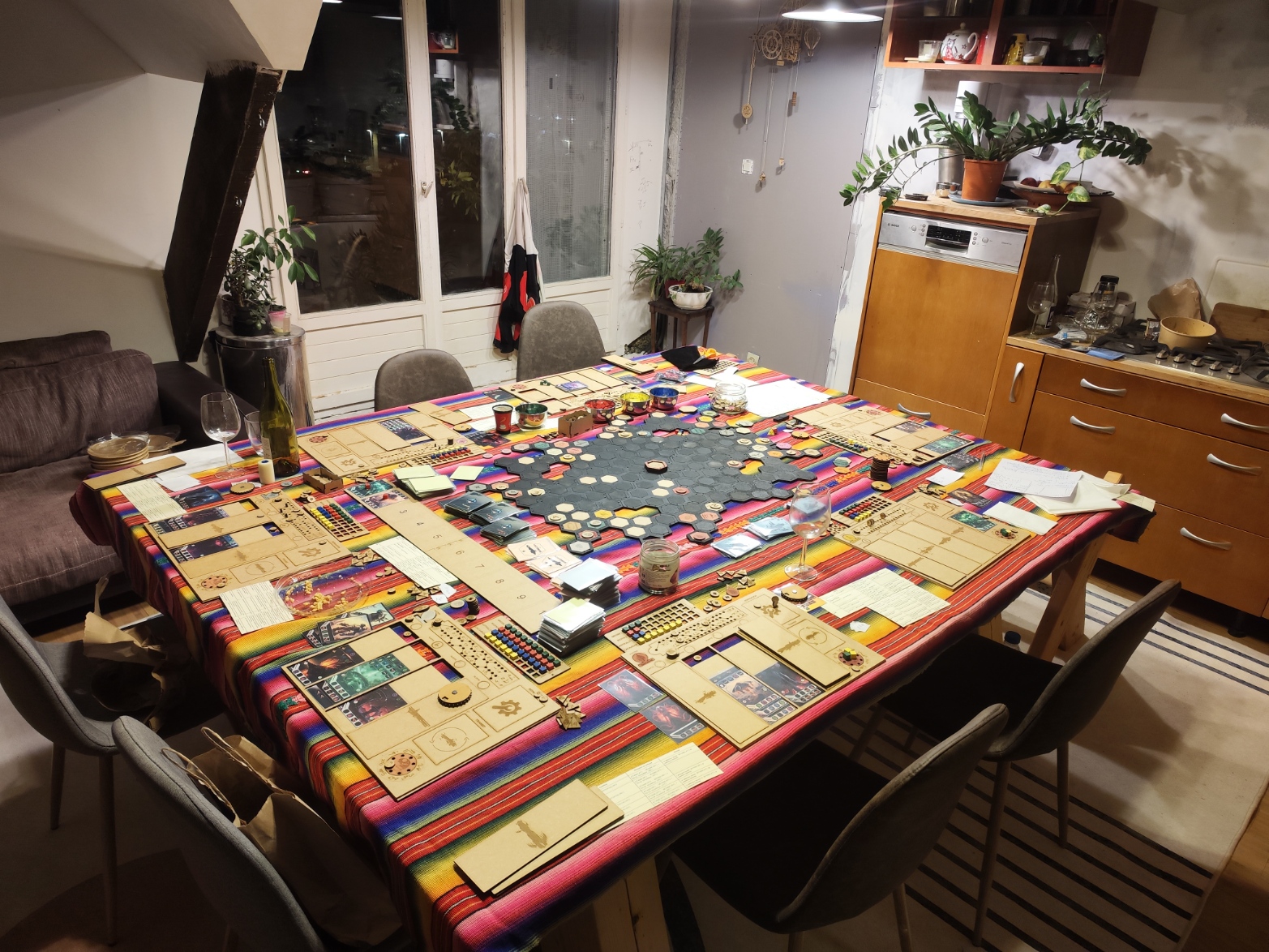Little Wars, the first wargame 🇬🇧
Little Wars is a set of simple rules for playing a wargame, written by the English novelist H. G. Wells in 1913. It is a strategy game simulating a war with miniature figures 50 mm high. The rules use infantry, cavalry, and artillery in the form of a cannon that fires projectiles to take down enemy soldiers. In addition to being a game, the book alludes to several philosophical aspects of war.






The book is written in a whimsical style and illustrated with drawings by the underappreciated and talented J. R. Sinclair, as well as photographs of a game played that Wells describes in the book. Wells also describes the game from the perspective of one of the generals in the battle, who recounts his memories with enthusiasm. The Galactic Orbit Circle will be making a new French translation, edited with tokens, through crowdfunding.






New French Edition of Little Wars
We propose to translate and create a new luxury edition through crowdfunding on Game On Tabletop. We would like to give a significant place to the engravings of J.R. Sinclair by offering vectorized and colorized versions of these marginal illustrations from the original edition. And these illustrations, perfectly adapted to the text, will also be used to put the book’s rules into practice! We will manufacture soldier, cavalry, and elastic cannon tokens, made of printed and pre-cut cardboard. The Galactic Orbit Circle will thus offer a fully immersive gaming experience in the works of the great elders of science fiction, author H. G. Wells, and illustrator J. R. Sinclair.

Eight (8) postcards printed on soft card, illustrated by Henrique Alvim Corrêa, from The War of the Worlds (1906) with one (1) enveloppe “de prestige”. They are printed in first a limited edition of a sixteen (16) sets. This limited print is done for the crowd funding of a new print of H.G. Wells “Little Wars”
H. G. Wells
Herbert George Wells, was a British writer known for his science fiction novels, born in 1866 and died in 1946 in London. He is the author of numerous novels of social satire, works of foresight, political and social reflections, as well as popular science books covering biology, history, and social issues. He is considered by some as the father of contemporary science fiction.
Wells’ thoughts on war, known to be a pacifist, are revealed in his writings. According to Wells, the idea of the game originated from a visit by his friend Jerome K. Jerome to show the absurdity and emptiness of combat. After dinner, Jerome started shooting lead soldiers with a spring-loaded cannon, and Wells joined him in competition. The two men decided that by adding written rules, a good game of the Kriegsspiel type could be developed.
 Wells uses a piece of string cut to a determined length for the distance his soldiers can move. A referee sits on a chair and times Wells. Wells’ opponent waits for his turn to move and fire with his spring-loaded cannon at Wells’ soldiers.
Wells uses a piece of string cut to a determined length for the distance his soldiers can move. A referee sits on a chair and times Wells. Wells’ opponent waits for his turn to move and fire with his spring-loaded cannon at Wells’ soldiers.
Little Wars
In french military terminology, “petites guerres” (“little wars”) refers to all actions related to military operations other than pitched battle, ranging from reconnaissance to attacks on the enemy’s army supply lines. Widely used from the 17th to the 19th century, this term has fallen somewhat into disuse in contemporary times, which have replaced it with terms such as harassment warfare, unconventional warfare, or guerrilla warfare, among others. It was theorized notably by Maurice de Saxe (1696-1750), and Mao Zedong addressed its modern form in his Little Red Book in chapters devoted to “revolutionary war.”

The Genesis of Wargaming
Although sculptures representing soldiers on maps were used for war simulation games in the Middle Ages and antiquity, it was not until 1824 that true rule theorization was seen through the “Kriegsspiel” game. This game was created by a Prussian officer named Georg von Reisswitz to be used by the staff of his country as a war simulator.
In search of a more structured way to play war games, Wells conceived the games Floor Games (1911) and Little Wars (1913), which established rules for conducting battles with lead soldiers. Little Wars is now recognized as the first recreational war game, and Wells is considered by players and enthusiasts as “the father of miniature war gaming,” the wargame. However, this book had not been translated into French before 2018.
Little Wars was first published in 1913 by Frank Palmer, Da Capo Press reissued it in 1977. There have been many other reprints, and it is now available online on Project Gutenberg, along with Floor Games. A 2004 edition of the book published by Skirmisher Publishing includes a foreword by Gary Gygax.

The game revolves around the use of lead soldiers and battlefields made of all available materials, usually stacks of books or other toys. Simple rules for movement, shooting, and close combat were developed, with each player having a set time to move and fire. Wells also devotes a chapter to “Extensions and Amplifications of Little Wars.” In an appendix, Wells proposes “Little Wars and Kriegspiel,” more complex rules to be played in a larger space, involving military logistics, engineering, cavalry charges, and troop rail transport.










